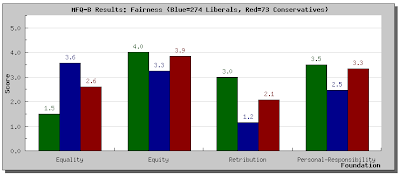Here’s a fascinating online test being conducted by Jonathan Haidt and his colleagues at the University of Virginia that explores the differences in moral values between liberals and conservatives. You can take the “Moral Foundations Questionnaire” here. Here are my results.
Fairness values:
Fairness as egalitarianism (e.g., “ideally, everyone would end up with the same amount of money)
- Personal liberty (e.g., “everyone should be free to do as they choose…”);
- Freedom from government (e.g., “the government interferes too much in our everyday lives”);
- National autonomy (e.g., “I want my nation to stay clear of treaties that will limit…”)
Take the test then post your results in the comments section. I’d be very interested to see how regular B.R. commenters (and anyone else who cares to identify him/herself) compare on moral values.


Leave a Reply
You must be logged in to post a comment.